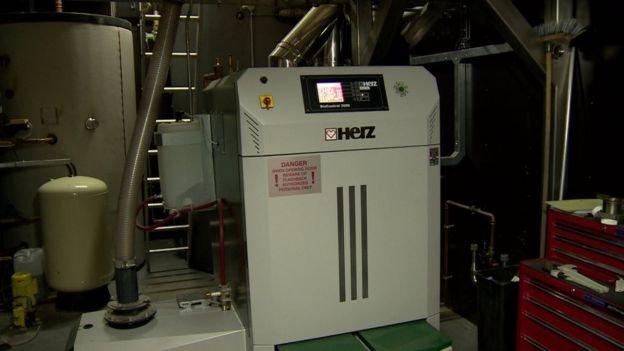RHI inquiry: Arlene Foster to be quizzed over key assumptions
- Published

The inquiry was told another scheme was available which could have saved £200m
Former minister Arlene Foster will be asked whether she questioned key assumptions in plans for NI's RHI scheme, the inquiry has been told.
Junior counsel Donal Lunny said the panel would want to know whether she had been asking questions or reviewing documents sent to her.
Mrs Foster was minister in the department, which oversaw the introduction of the initiative.
An inquiry is being held into the green energy scheme after costs spiralled.
Mr Lunny said Mrs Foster would be asked whether she had been "challenging recommendations" presented to her by officials recommending approval of the complex new policy.
The inquiry was told that a key submission referred to her and her advisers for a decision in 2011 had been based on a draft economic appraisal by energy consultants rather than on the final version.
Mr Lunny said this posed a series of questions about whether the information in that submission had contained "accurate and comprehensive details" on issues such as available funding and the different options available for a Northern Ireland Renewable Heat Incentive (RHI).
Earlier, the inquiry was told that consultants had provided a number of models to departmental officials for a renewable heat scheme including one which would have produced more heat at a significantly lower price.

Hundreds of biomass boilers were bought and installed as a result of the scheme
It heard that had a competitive grant-based system been chosen, it would have cost £200m less than the subsidy scheme finally put in place.
The inquiry heard that the reason it had not been picked could have been because of concerns about the long-term funding available from Treasury for renewable heat and the fact it did not mirror what was happening in Great Britain's scheme.
It was felt this might mean some potential scheme applicants might be opposed.
On Thursday afternoon, the inquiry heard that a report by the energy consultants in 2012 clearly identified the "burn to earn" flaw in the scheme.
Cambridge Economic Policy Associates (CEPA) said the average biomass price in Northern Ireland was 3.37p per kilowatt hour. In the same report, they recommended a subsidy level of 5.9p per kilowatt hour.
Mr Lunny said despite the discrepancy, CEPA had not flagged up the issue of dealing with it by introducing a tiered tariff to the Department of Enterprise Trade and Investment (DETI).
He said this was because they had not been asked for tiering and now felt DETI should have spotted the issue.
Inquiry chair Sir Patrick Coghlin said the "man in the street" would have understood that the price difference would "invite people to take up as much as they could".'
'Truly bad advice'
Later the inquiry produced an internal email from CEPA which acknowledged it had given "truly bad" advice to departmental officials on the subsidy levels.
CEPA's Kirby Owen told a colleague in November 2016 that whoever had produced the 2012 work had "missed completely or skated over" the fact that the subsidy had been set higher than the fuel cost.
Mr Lunny asked whether - even if advice on a tiered tariff was outside the remit of the work it was asked to do - the CEPA should have alerted DETI to the need for it.
- Published16 November 2017

- Published7 November 2017
